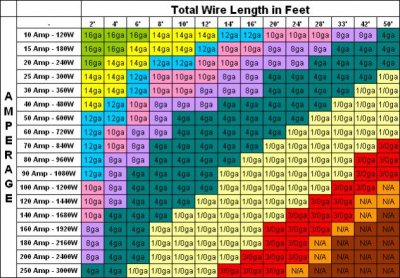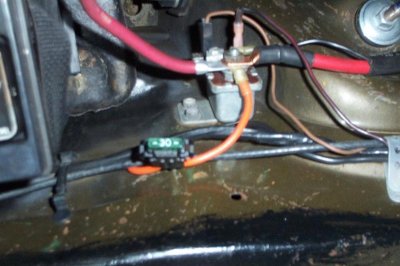You are using an out of date browser. It may not display this or other websites correctly.
You should upgrade or use an alternative browser.
You should upgrade or use an alternative browser.
Question about Fusible Link
- Thread starter lynchroad
- Start date
eagleone1983
Well-Known Member
Your amperage for the fuse would depend on the circuit you are putting it on. For instance you wouldn't put a 10A fuse on a circuit that would normally see 10-12 amps. I can't tell you whether or not there is a direct corellation to the fusible link gauge and fuse size.
Mogre
Well-Known Member
- Local time
- 5:33 PM
- Joined
- Jul 29, 2012
- Messages
- 1,077
- Reaction score
- 276
- Location
- The Swamps of Alcona
Fusible links should be 4 wire sizes smaller than the main wire. I ran #8 wire from the alternator with six inches of #12 fusible link wire to the starter relay to bypass the bulk head connector for the amp guage after a melt down. Remember to solder all connections and shrink wrap before taping.
Hi
My knowledge in electricity is limited, so here's a dumb question.....
Can a 16 Ga fusible link be replaced by a Fuse,(the newer flat ones) and in that case how many Ampere ?
Thanks.
A fusible link does not blow quickly, as most fuses do. There are slow blow fuses, but they still "operate" faster than a fusible link. The fusible link is really intended to protect your wiring harness from a melt down. It can withstand surges that a fuse probably wouldn't, unless you go with a large fuse, maybe a 30 or 50 amp.
I would strongly suggest keeping the original fusible link.
lynchroad
Well-Known Member
OK, My thinking was if the fus.link blows, it would be easier to change a fuse than solder a new fus.link. But on second thought, if it blows the main reason to it is still there and have to be solved.
Anyway, thanks all for your answers !
Anyway, thanks all for your answers !
747mopar
Well-Known Member
I like fuses instead but hsorman is correct. The only time I use a fuse to replace a fusible is when you have a case where you have a wire size that is capable of carrying way more amps then you are using. You can over fuse for your needs but still be within the safe limit of the wire capacity. I'm finishing up my wiring and have a 10 gauge main fuse panel feed that is capable of 100 amps at 3', once I get everything up and running I will put an amp clamp on it fully loaded, my guess is that I'll likely be way under 100 amp probably more in the 50 amp range if so I'll put a 80-100 amp fuses in it and forget it. I don't like the idea of a wire that literally burns in half (fusible link) in order to do it's job, that's just me though.
- Local time
- 4:33 PM
- Joined
- Jul 31, 2011
- Messages
- 9,002
- Reaction score
- 4,116
- Location
- Western Colorado High Desert
I run 30 amp fuse with a 10 gal wire. Standard fuse, not a slow blow or a larger fuse. Putting a larger fuse is asking for trouble. 10 gal wire is rated for 30 amps.
This coming from a retired Master Electrician
This coming from a retired Master Electrician
Last edited:
747mopar
Well-Known Member
I should have specified that my 10 gauge wire is "high temp GXL spiral wound" and IS rated for 100 amps at 3'. Your correct that normal 10 gauge wire is usually fused for 30 amps but if you look it up the amps will increase as the wire gets shorter.I run 30 amp fuse with a 10 gal wire. Standard fuse, not a slow blow or a larger fuse. Putting a larger fuse is asking for trouble. 10 gal wire is rated for 30 amps.
This coming from a retiered Master Electrician
- Local time
- 4:33 PM
- Joined
- Jul 31, 2011
- Messages
- 9,002
- Reaction score
- 4,116
- Location
- Western Colorado High Desert
I should have specified that my 10 gauge wire is "high temp GXL spiral wound" and IS rated for 100 amps at 3'. Your correct that normal 10 gauge wire is usually fused for 30 amps but if you look it up the amps will increase as the wire gets shorter.
10 ga rated for 100 amps, by who?
Your last statement makes no sence. "Look up" where? The NEC?
- Local time
- 12:33 AM
- Joined
- Oct 8, 2012
- Messages
- 6,234
- Reaction score
- 2,627
- Location
- Valencia, España
I wouldn't ever install a fuse... fuse link is the way to go
16 or 14ga, depending on alternator and batt being used
16 or 14ga, depending on alternator and batt being used
kdtjb
Well-Known Member
- Local time
- 4:33 PM
- Joined
- Jan 24, 2010
- Messages
- 2,062
- Reaction score
- 318
- Location
- In a van, down by the river,
What are you guys thoughts on a circut breaker? I put a 30 amp on my 64 Sport Fury. The car had a melt down under the dash before I got it. I added up the amps I would be drawing and came up with 30, probably can't honk the horn with lights, heater, wipers, ect. ha ha.
747mopar
Well-Known Member
Hears a chart, I couldn't find one for the type of wire I'm running but if you look at it you'll see how the amp capacity goes up as it shortens.10 ga rated for 100 amps, by who?
Your last statement makes no sence. "Look up" where? The NEC?
Attachments
- Local time
- 4:33 PM
- Joined
- Jul 31, 2011
- Messages
- 9,002
- Reaction score
- 4,116
- Location
- Western Colorado High Desert
I wouldn't ever install a fuse... fuse link is the way to go
16 or 14ga, depending on alternator and batt being used
Why cus Nacho? A fuse link is just that, a fuse. A permanent, sealed, non-renewable fuse. The factories used links because they are sealed and probably would never need replaced during the life of the car. Atleast Chrysler put theirs up by the battery. On GM's there are 2 or 3 of them down coming off of the starter.
I've used a properly sized fuse holder and fuse in my cars for decades. Drove my El Camino for 20 years that way with no problems ever.
- - - Updated - - -
Hears a chart, I couldn't find one for the type of wire I'm running but if you look at it you'll see how the amp capacity goes up as it shortens.
Interesting. Where is this chart from? What type of wire?
Attachments
- Local time
- 12:33 AM
- Joined
- Oct 8, 2012
- Messages
- 6,234
- Reaction score
- 2,627
- Location
- Valencia, España
fuse blows easier than fuse link, with any MINIMAL overload or peak. Fuse link holds any peak
- - - Updated - - -
Chart posted is for wires not for fuse links...
- - - Updated - - -
Chart posted is for wires not for fuse links...
Similar threads
- Replies
- 38
- Views
- 4K
- Replies
- 6
- Views
- 3K
- Replies
- 1
- Views
- 1K


















